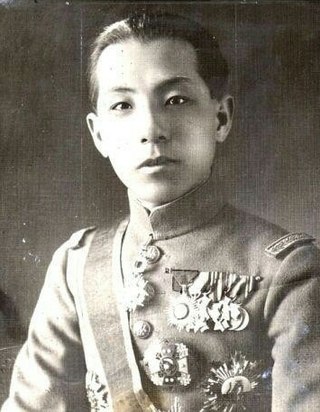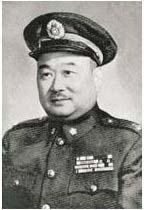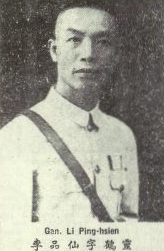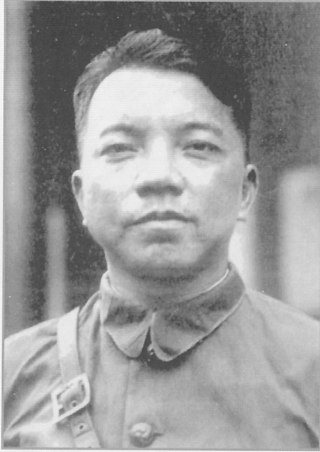| |||||
| Decades: | |||||
|---|---|---|---|---|---|
| See also: | Other events of 1947 History of China • Timeline • Years | ||||
This is a list of events in the year 1947 in the Republic of China. This year is numbered Minguo 36 according to the official Republic of China calendar.
| |||||
| Decades: | |||||
|---|---|---|---|---|---|
| See also: | Other events of 1947 History of China • Timeline • Years | ||||
This is a list of events in the year 1947 in the Republic of China. This year is numbered Minguo 36 according to the official Republic of China calendar.

Chiang Kai‐shek, also known as Jiang Zhongzheng and Jiang Jieshi, was a Chinese politician, revolutionary, and military leader who served as the leader of the Republic of China (ROC) and the Generalissimo from 1928 to his death in 1975 – until 1949 in Mainland China and from then in Taiwan. Following the Kuomintang's defeat by the Chinese Communist Party in the Chinese Civil War, he continued to lead the ROC government in Taiwan until his death.

Chang Hsueh-liang, also romanised as Zhang Xueliang and known later in life as Peter H. L. Chang, was the warlord of Manchuria and commander-in-chief of the Northeastern Army after the assassination of his father, Zhang Zuolin. A reformer who was sympathetic to nationalist ideas, he completed the official reunification of China at the end of the Warlord Era by pledging loyalty to the Nationalist government in Nanjing. He nonetheless retained Manchuria's de facto autonomy until the Empire of Japan invaded and occupied the region in 1931. He was frustrated by Chiang Kai-shek's policy of "first internal pacification, then external resistance" and helped plan and lead the 1936 Xi'an Incident. Northeastern soldiers under Chang's command arrested Chiang to force him to negotiate a Second United Front with the Chinese Communist Party against Japan. Chiang eventually agreed, but upon his release he had Chang arrested and sentenced to 50 years of house arrest, first in mainland China and then in Taiwan. Although never personally a communist, Chang is regarded by the Chinese Communist Party and the People's Republic of China as a patriotic hero for his role in ending the encirclement campaigns and beginning the war of resistance against Japan.

Zhou Enlai was a Chinese statesman who served as the first Premier of the People's Republic of China from September 1954 until his death in January 1976. Zhou served under Chairman Mao Zedong and aided the Communist Party in rising to power, later helping consolidate its control, form its foreign policy, and develop the Chinese economy.

The Chinese Civil War was fought between the Kuomintang-led government of the Republic of China and forces of the Chinese Communist Party, with armed conflict continuing intermittently from 1 August 1927 until 7 December 1949, and ending with Communist control of mainland China.

Li Zongren or Li Tsung-jen, courtesy name Telin, was a prominent Guangxi warlord and Kuomintang (KMT) military commander during the Northern Expedition, Second Sino-Japanese War and Chinese Civil War. He served as vice-president and acting President of the Republic of China under the 1947 Constitution.

Liu Zhi was a prominent Kuomintang military and political leader in the Republic of China.

Feng Yuxiang, courtesy name Huanzhang (焕章), was a warlord and a leader of the Republic of China from Chaohu, Anhui. He served as Vice Premier of the Republic of China from 1928 to 1930. He was also known as the "Christian General" for his zeal to convert his troops and the "Traitorous General" for his penchant to break with the establishment. In 1911 he was an officer in the ranks of Yuan Shikai's Beiyang Army but joined forces with revolutionaries against the Qing dynasty. He rose to high rank within Wu Peifu's Zhili warlord faction but launched the Beijing Coup in 1924 that knocked Zhili out of power and brought Sun Yat-sen to Beijing. He joined the Nationalist Party (KMT), supported the Northern Expedition and became blood brothers with Chiang Kai-shek, but resisted Chiang's consolidation of power in the Central Plains War and broke with him again in resisting Japanese incursions in 1933. He spent his later years supporting the Revolutionary Committee of the Kuomintang.

Chen Cheng was a Chinese political and military leader, and one of the main commanders of the National Revolutionary Army during the Second Sino-Japanese War and the Chinese Civil War.

Zhang Qun, was premier of the Republic of China and a prominent member of the Kuomintang. He served as secretary general to the President of the Republic from 1954 to 1972 and senior advisor to Presidents Chiang Kai-shek, Yen Chia-kan, Chiang Ching-kuo, and Lee Teng-hui. Under the influence of his wife, Ma Yu-ying, he became a Christian in the 1930s.

Zhang Zhizhong or Chang Chih-chung was a Chinese military commander and politician, general in the National Revolutionary Army of the Republic of China and later a pro-Communist politician in the People's Republic of China.
Zhengtai Campaign was a series of battles fought between the nationalists and the communists during Chinese Civil War in the post World War II era, and resulted in the communist victory.

Li Pinxian was a Republic of China Army general from Cangwu County, Guangxi. His career spanned the Xinhai Revolution, Warlord Era, the Second-Sino Japanese War, and the Chinese Civil War. After the loss of the mainland to the Chinese Communist Party in 1949, he left for Taiwan.

He Zhuguo (simplified Chinese: 何柱国; traditional Chinese: 何柱國; pinyin: Hé Zhùguó; Wade–Giles: Ho2 Chu4-kuo2; 1897– September 3, 1985) was a Chinese general from Rong County, Guangxi, who served in the Fengtian Army and later the National Revolutionary Army. He was a member of the Hakka ethnicity. As a commander of a cavalry force under Zhang Xueliang, he escaped assassination by KMT radicals during the Xi'an Incident by the help of Yang Hucheng. In the People's Republic of China, he is celebrated by the Revolutionary Committee of the Kuomintang for his participation in the Second United Front between the KMT and the Communist Party of China against Japanese invaders during the Second Sino-Japanese War.

Chang Li-sheng was a Chinese politician and diplomat who served as the Secretary General of the Kuomintang from 1954 to 1959. L.S. Chang as he was commonly known, played a key role in Republic of China (ROC)’s political, economic, financial, and foreign affairs as well as in Kuomintang affairs from the 1920s until his death in Taiwan in 1971. Throughout his political life over four decades, Chang served in numerous important posts within both the KMT and the ROC’s local and central governments. He was a rare example of Chinese political virtues, noted for his integrity and honesty. He is remembered for numerous achievements and deeds, including his role in assisting Chen Cheng (1897-1965), former Taiwan provincial governor, Premier, and Vice President, to launch Taiwan’s local autonomy, economic and land reforms.

Li Jishen or Li Chi-shen was a Chinese military officer and politician, general of the National Revolutionary Army of the Republic of China, Vice Chairman of the People's Republic of China (1949–1954), Vice Chairman of the National People's Congress (1954–1959), Vice Chairman the Chinese People's Political Consultative Conference (1949–1959) and founder and first Chairman of the Revolutionary Committee of the Kuomintang (1948–1959).
Events from the year 1953 in Taiwan, Republic of China. This year is numbered Minguo 42 according to the official Republic of China calendar.
Events from the year 1964 in Taiwan, Republic of China. This year is numbered Minguo 53 according to the official Republic of China calendar.
Events from the year 1966 in Taiwan, Republic of China. This year is numbered Minguo 55 according to the official Republic of China calendar.
Events in the year 1948 in Taiwan, Republic of China.

The Chiang-Gui War was a military conflict between the Nationalist government of Chiang Kai-shek against the warlord army of Guangxi that lasted from March until June 1929. A later conflict, the 2nd Chiang Gui-War, occurred between the two opposing factions in November and December of the same year.